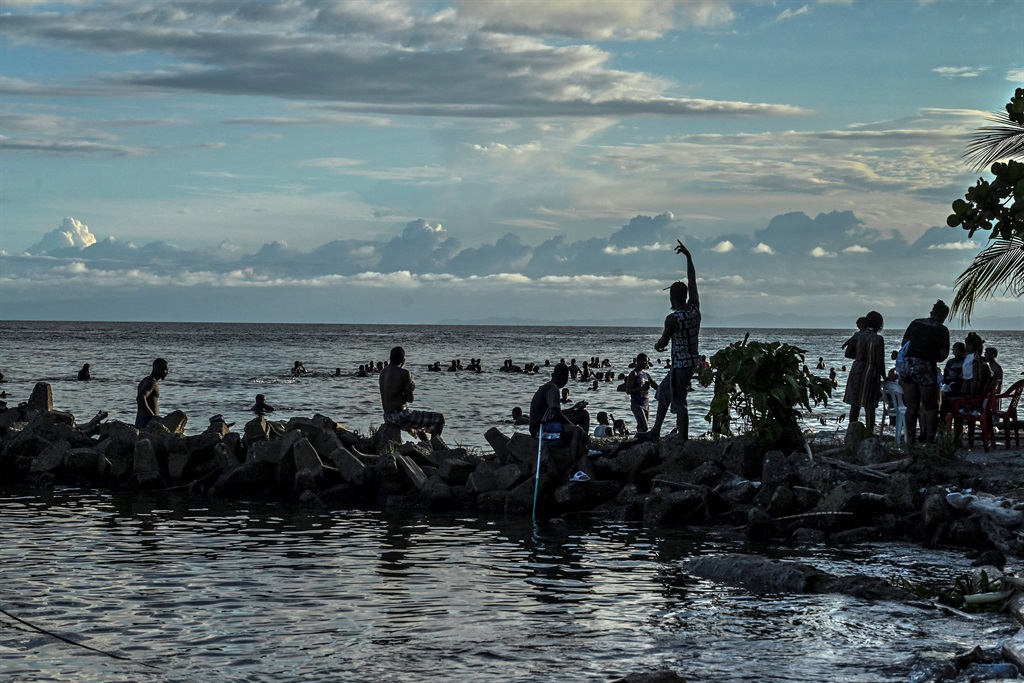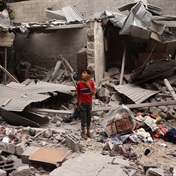- Last Sunday, 580 people emerged from the Darien Gap - a 575 000-hectare jungle which UNICEF says is one of the world's most dangerous routes.
- It is infested with armed gangs and drug traffickers who often rob or attack the migrants crossing it.
- In a bid to cope, Panamanian and Colombian authorities have agreed to allow the passage of 500 migrants a day.
When Moise Cliff Raymond arrives at the Tuquesa River, he plunges in to wash off the filth from trekking five days through the perilous Darien Gap jungle in order to cross the Colombian border into Panama.
The Haitian and his companions, who have just arrived at Bajo Chiquito - the first community on the Panama side - are covered in mud after the previous night's heavy rain.
The 29-year-old, wearing a rastacap, said:
While Raymond walked, other migrants who had spare cash or children chose to hire a canoe taxi to take them to the village's small port.
Another Haitian, Peter, struggled into one of the canoes while holding onto his three-year-old daughter.
"This is how things are. You have to do it if you want a new life. Things are very difficult for us Haitians," said the 29-year-old, who did not give his last name.
So far in 2021, 64 000 migrants have crossed the jungle, including 18,000 in August alone, according to Panama's Security Minister Jean Pino.
Most of them are Haitians.
Last Sunday, 580 people emerged from the Darien Gap - a 575 000-hectare jungle which UNICEF says is one of the world's most dangerous routes.
It is infested with armed gangs and drug traffickers who often rob or attack the migrants crossing it.
In a bid to cope, Panamanian and Colombian authorities have agreed to allow the passage of 500 migrants a day.
They all arrive in Bajo Chiquito, a village that is home to members of the Embera indigenous people.
However none of the migrants want to stay there.
Raymond said:
He still has a long way to go.
Migrants set off at 06:00 and walk for 12 hours a day, said Yadira Rosales, one of a small number of Cubans among the throngs.
Rosales, who travelled with her husband Jose Alberto Reyes and five-year-old daughter Adelis, said:
All migrants tell stories of attacks by armed groups, including murders and sexual assaults.
"We ran into some but we were in a group. They took our money and let us go. They went through the belongings of those that didn't have money," said Rosales.
In Bajo Chiquito there is a post run by the Ministry of Health and Doctors Without Borders (MSF) where around 400 migrants are treated daily.
Sofia Vasquez, an MSF doctor, said:
After registering with local migration officials, most migrants settle down on a basketball court in the center of the village, surrounded by small businesses and people selling lunch for $3, a sum not everyone can afford.
"This year we got together a bit and prepared to receive them in the community. We installed businesses and food stalls in different places," said Nelson, a community leader.
The village has also installed water pipes from portable tanks for hygiene purposes.
Locals offer to send WhatsApp messages for $2 and villagers have set up a wire transfer system for the migrants, collecting a 20 percent commission.
The number of children taken through the Darian Gap has multiplied 15-fold in four years, says UNICEF.
Many arrive in Panama dehydrated or with breathing difficulties due to exposure to rain and humidity, says Vasquez.
Reyes says his daughter Adelis "is very strong" and "walked a lot".
She smiles as if it was nothing more than a stroll.
Most of the francophone Haitians speak a little Spanish, after spending three or four years working in Chile before deciding to head north - whether due to losing their jobs to the coronavirus pandemic or suffering mistreatment and racism.
On Monday morning, a low mist covers the village and the migrants queue to pay $25 to board a canoe that will take them up river to a shelter in nearby Lajas Blancas.
They are given an orange life vest and told not to make sudden movements in the canoe.
"You already know what could happen," says one of the boatmen ominously.
From Lajas Blancas, the migrants will travel by land to San Vicente where they have to pay $40 for a bus trip to the Costa Rican border.
From there, they still have to make it through Nicaragua, Honduras, Guatemala and Mexico before finally reaching the US border.
Their odyssey has only just begun.
Never miss a story. Choose from our range of newsletters to get the news you want delivered straight to your inbox.




 Publications
Publications
 Partners
Partners
























